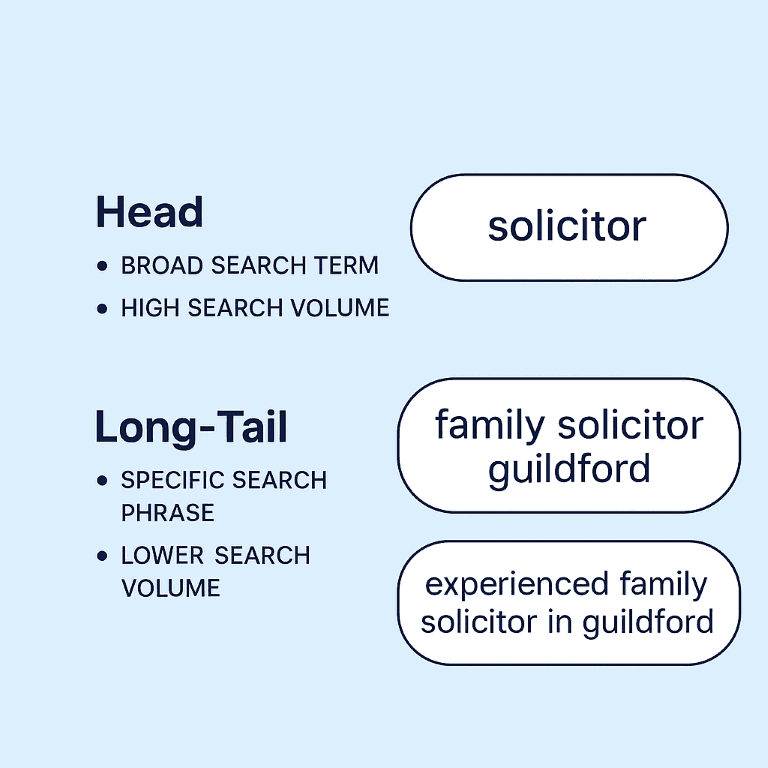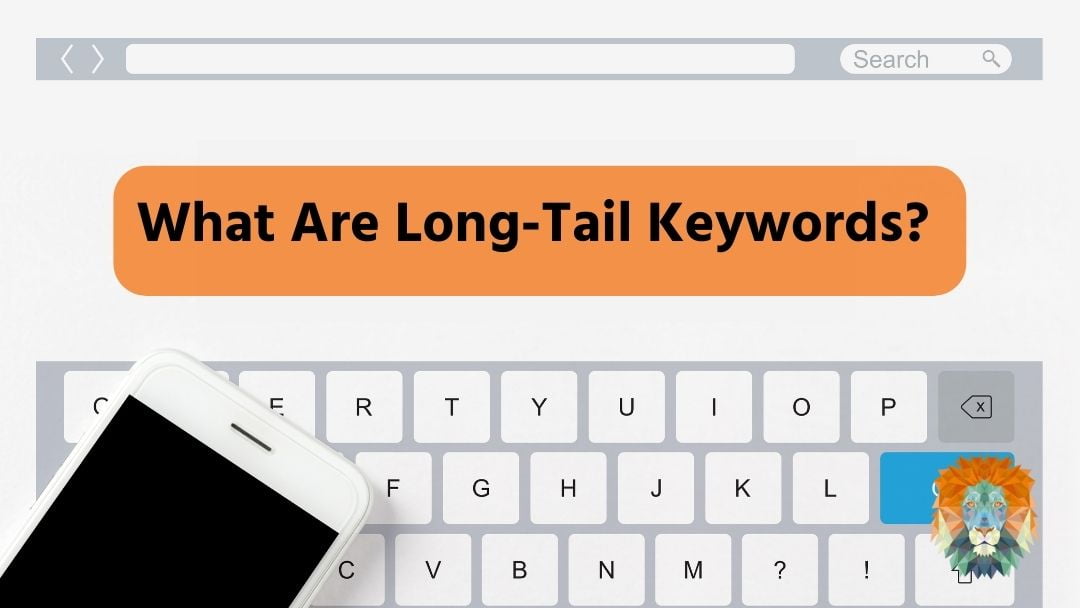If you’re trying to get your business seen online, you’ve probably heard the term keyword thrown around. But did you know not all keywords are created equal?
In fact, one type — the long-tail keyword — is a powerful tool for helping local businesses (like plumbers, salons, and solicitors) show up in the right searches and attract more of the right kind of traffic.
In this guide, we’ll break down what long-tail keywords are, how they work, and why they’re essential to your local SEO strategy. Plus, we’ll show you how to find and use them to bring in more leads.
🚀 What Is a Long-Tail Keyword?
A long-tail keyword is a highly specific search phrase that usually contains three or more words. While they tend to have lower search volumes than broad or “head” keywords, they come with much higher intent — meaning the people searching for them are more likely to convert.
Example:
- Head keyword: “solicitor”
- Long-tail keyword: “family solicitor in Guildford”
The first term is broad — it could be someone researching careers or looking up legal definitions. But the second? That’s likely someone ready to book a legal consultation. This is the key to long-tail keyword power.
🎯 Why Are Long-Tail Keywords So Valuable for Local Lead Generation?
For small, local businesses trying to rank on Google, long-tail keywords are your best friend. Here’s why:
1. They’re Less Competitive
Popular search terms like “plumber” or “hair salon” are dominated by big companies, directories, and nationwide chains. Long-tail keywords like “emergency plumber in Farnham” have fewer businesses competing for the top spot — giving you a better chance to be seen.
2. They Attract Ready-to-Buy Customers
Long-tail keywords often signal buying intent. If someone searches for “best salon for balayage near me” or “24/7 boiler repair in Reading,” they’re not just browsing — they’re looking to book.
3. They Help You Rank Locally
Google loves relevance. Using location-specific long-tail keywords helps your business show up in local search results — a key part of local SEO success.
4. They’re Ideal for Niche Services
If you offer specialised services — like commercial waste disposal or legal advice for startups — long-tail keywords let you target those specific needs instead of competing in a broad space.
🧠 Long-Tail Keyword Examples by Industry
To give you a clearer picture, here are some examples of how long-tail keywords apply across industries:
| Industry | Head Keyword | Long-Tail Keyword Example |
|---|---|---|
| Plumbing | “Plumber” | “gas safe plumber for boiler service in Guildford” |
| Legal | “Solicitor” | “conveyancing solicitor near me in Woking” |
| Beauty | “Hair salon” | “affordable balayage salon in Basingstoke” |
| Healthcare | “Private clinic” | “private GP appointments in Farnborough” |
Looking to attract more plumbing clients? Check out our SEO agency for plumbers or website design for plumbers.

🛠️ How to Find Long-Tail Keywords for Your Website
All of that sounds great, so how do you find your own long-tail keywords? After all, you can’t just pick keywords out of the air Ready to use long-tail keywords but not sure where to start? Here are four simple ways to uncover the right ones for your business:
1. Use Keyword Research Tools
Try tools like:
- Google Keyword Planner
- SE Ranking
- Ubersuggest
- AnswerThePublic
These platforms help you find real search queries people are typing into Google. Combine that with location names and service terms for laser-targeted results.
➡️ Bonus: Our Free SEO Audit Tool can also give you insight into what keywords you currently rank for — and where you have opportunities.
2. Start With Your Services
Break down what you offer into specifics. Instead of “boiler repair,” think “emergency boiler repair in Aldershot.” Instead of “legal help,” try “no win no fee solicitor in South London.”
Our website copywriting service can help turn these ideas into content that performs.
3. Analyse Your Competitors
Tools like SE Ranking or Ahrefs let you see what your competitors rank for. If another plumber in your area ranks for “unvented cylinder installer in Hampshire,” that might be a keyword worth targeting too.
Explore competitor strategies in our blog: How to Perform an SEO Audit on Your Website
4. Use Forums and FAQs
Sites like Reddit, Quora, and local Facebook groups are packed with real questions people are asking. These often make brilliant long-tail keywords and content ideas.
✍️ How to Use Long-Tail Keywords in Your Content
Once you’ve found your keywords, it’s time to put them to work:
- Add them naturally into headings and subheadings.
- Use them in image alt text and meta descriptions.
- Create dedicated service pages or blog posts targeting them (like “how to choose a solicitor in Guildford”).
- Don’t keyword-stuff — keep it natural and readable.
Need help structuring your content? Read our guide on How to Write Website Content.
📈 Long-Tail Keywords in Action: What You Can Expect
According to a recent study by Backlinko, long-tail keywords make up over 91% of all search traffic — and they’re 3 to 5 times more likely to convert than short, generic keyword..
So even though each one gets fewer monthly searches, they’re far more likely to bring you leads and enquiries.
🤝 Let’s Find the Right Long-Tail Keywords for Your Business
At SoNick Marketing, we specialise in local SEO and content strategies that bring in real-world results. Whether you run a salon, law firm, plumbing company, or healthcare business, we’ll help you:
- Find long-tail keywords that match your services
- Optimise your website to rank locally
- Turn traffic into real leads
📞 Book a free strategy call or explore our tailored SEO packages to get started.




0 Comments